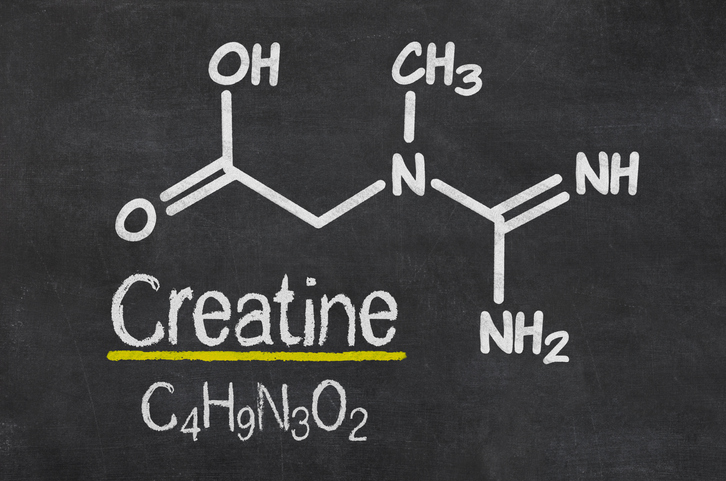Creatine Isn’t Just For Bodybuilders. Here’s Why We Need To Know About Creatine Deficiency

By Joy Stephenson-Laws, J.D., Founder
Creatine. It’s one of those nurients that many people know is important for bodybuilding. But although it is true that creatine is important for building muscle, there is much more to it.
Creatine is an amino acid that is mostly found in the body’s muscles. According to the National Institutes of Health (NIH), 95 percent of our creatine stores are in our skeletal muscle and five percent are distributed in the brain, liver, kidney and testes. We naturally produce about one gram of creatine per day and then the rest we can attain through diet and supplementation. Vegans and vegetarians tend to have lower levels of creatine, because it is abundant in red meat and seafood. Creatine supplements will usually provide levels of creatine far beyond what your body can produce or the amount in natural foods.

“Regardless of the form, supplementation with creatine has regularly shown to increase strength, fat free mass, and muscle morphology with concurrent heavy resistance training more than resistance training alone,” reports the NIH.
Creatine may also:
- Help treat brain disorders.
“In relation to the brain, creatine has been shown to have antioxidant properties, reduce mental fatigue, protect the brain from neurotoxicity, and improve facets/components of neurological disorders like depression and bipolar disorder,” reports the NIH.
“The combination of these benefits has made creatine a leading candidate in the fight against age-related diseases, such as Parkinson’s disease, Huntington’s disease, amyotrophic lateral sclerosis, long-term memory impairments associated with the progression of Alzheimer’s disease, and stroke.”
- Treat sarcopenia (age-related muscle loss).
Combined with resistance training, some studies have shown that creatine supplementation has a positive effect on aging muscle.
- Treat aging skin.
One study exhibited that topically applying creatine to the skin increased collagen synthesis. Furthermore, in vivo application of a formula containing creatine for just six weeks exhibited reduced cheek sagging intensity and a reduction in crow’s feet wrinkles.
Creatine and genetic disorders.But perhaps what is most powerful about creatine is that it may effectively treat people who have intellectual disabilities due to a genetic disorder which affects the way the body absorbs nutrients.
This is more serious than it sounds. An intellectual disability does not necessarily refer to a person being less smart than a person without a disability.
“Congenital genetic defects that cause metabolic disease are one important reason why some people are born with intellectual disability. The result is that the uptake and combustion of nutrients do not work normally,” according to one report.
“Untreated, such congenital diseases can cause intellectual disability. People can also become severely physically debilitated and eventually lose the ability to eat, talk and walk.”
As you can probably imagine, this greatly impacts the quality of life in a negative way and can lead to weight loss and extreme nutritional deficiencies and imbalances.
This report discusses the case of two Norweigan brothers both with the same genetic defect. Their conditions got worse as they became young adults and experienced symptoms such as difficulty chewing and swallowing. These brothers had bodies that were able to produce creatine, however, their bodies lacked the ability to transfer it properly in the body and get it to the brain.
“It is estimated that up to one percent of men with intellectual disability have a creatine deficiency,” according to the report mentioned earlier.
“Two genetic defects can cause creatine deficiency. For these patients, simply taking creatine supplements helps.”
But it wasn’t just any creatine supplement that did the job.
After much trial and error, the doctors working with the brothers found that a creatine supplement that contained betaine, a substance found in beets, was the most effective.
The brothers were able to walk normally again, their ability to eat improved and they were able to gain weight.
Many people who are born with genetic disorders and intellectual disabilities may not feel the effects until later on in life, which can make treatment difficult. Knowing that creatine may be a powerful treatment allows such people with these disorders to be proactive and talk to their doctor about the possibility of taking these supplements.
As always, it is imperative to discuss any supplements you are taking with a competent healthcare practitioner. It is also important to know that creatine supplements can be dangerous for people with kidney disorders or interact with high amounts of caffeine.
So as we can see, creatine is not just for bodybuilders. It may be a life-saving treatment for some.
Enjoy your healthy life!
Disclaimer: This article is not intended to provide medical advice. Please consult with your doctor or another competent healthcare practitioner to get specific medical advice for your situation.
The pH professional health care team includes recognized experts from a variety of health care and related disciplines, including physicians, attorneys, nutritionists, nurses and certified fitness instructors. This team also includes the members of the pH Medical Advisory Board, which constantly monitors all pH programs, products and services. To learn more about the pH Medical Advisory Board, click here.







